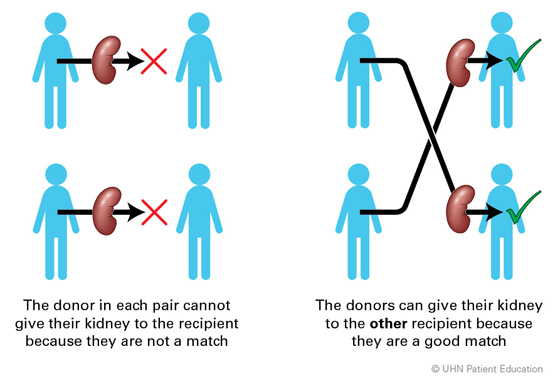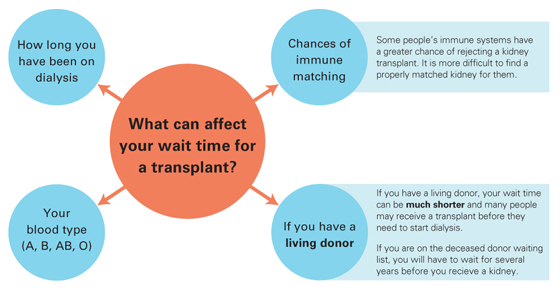The UHN Kidney Transplant Program offers Specialized Transplant Programs, which may help you have a kidney transplant sooner.
Living Donor Programs
Our Living Donor Kidney Transplant Program is the largest in Canada. The program offers kidney recipients (people who get a kidney transplant) the opportunity to live happier and healthier lives through the generosity of healthy living donors who wish to donate one of their kidneys to someone with end-stage kidney disease. Patients who receive a living kidney donor transplant have excellent results and often have a shorter wait time for a transplant.
For people wishing to donate a kidney (become a
living donor), our program makes sure that the process is safe and that their gift of life helps someone in need.
When a
donor is incompatible there are three options that can still be considered:
-
Kidney Paired Donation (KPD) Program
Canadian Blood Services (CBS), is the national organization that keeps a Canada-wide list of incompatible donor-recipient pairs for kidney transplant. We work with CBS through our KPD program, to find and match compatible donors and recipients anonymously across Canada. At the time of the transplant, a living donor's kidney is transplanted into a compatible recipient. In exchange the original recipient receives a kidney from a compatible donor in the registry. Here's an example of how it works when only two donor-recipient pairs are involved. Sometimes, more pairs are involved and may be found at many hospitals across Canada. As a result, some donors may need to travel to the cities for their surgery.

-
List Exchange Program
Our List Exchange Program enables living donors to donate a kidney to a patient on the waiting list for a "deceased donor". In exchange, your recipient moves up to the top of the waiting list for a deceased donor kidney.

-
Deceased Donor Program-Expanded Criteria Donor Program (ECD)
Our program has led the way in increasing the number of deceased donor kidneys that are available for transplantation. We do this by considering older donors who have excellent kidney function and placing them into our Expanded Criteria Program.
Since these donors are older and may have had other conditions, such as high blood pressure, kidneys transplanted from the ECD program may work for a slightly shorter period of time after transplantation, compared to kidneys from younger donors.
An ECD kidney transplant is an excellent option for patients who are at high risk of serious or life-threatening complications while waiting for a kidney transplant. Receiving a kidney from the ECD program may greatly shorten the wait time for a kidney and allow the recipient to continue to live their life with excellent kidney function. Your transplant nephrologist will let you know if the ECD program is the right option for you.
Highly Sensitized Patient Registry
Some patients have proteins called "antibodies" in their body that make it hard to find a matching kidney donor. Patients who have antibodies and cannot be matched to almost all possible kidney donors are called "highly sensitized patients" (HSP).
To help, we add their name to the Canadian Blood Services National HSP Registry. This program looks for donors from all over the country to find a match for these patients. This increases the chance of finding a kidney transplant match.
Desensitization Program
Even when a donor and recipient are incompatible, a living donor transplant may still be possible through our desensitization program. The 'desensitization' process works to reduce the chances of the recipient having a reaction to the donor kidney. In order for this to happen,
the recipient will need several treatments with specialized medications through our desensitization process. There are special tests that will be done to determine the exact treatment required. In some cases desensitization cannot be done or may not be the best option. Your transplant coordinator or doctor will discuss if this option is right for you.
